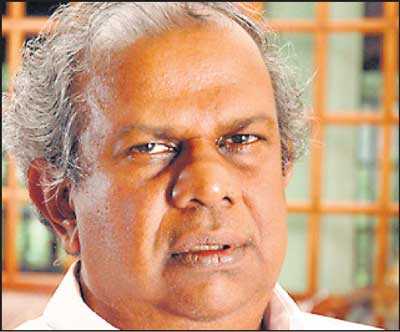Wednesday Feb 25, 2026
Wednesday Feb 25, 2026
Wednesday, 16 January 2019 00:00 - - {{hitsCtrl.values.hits}}
Good governance activist Chandra Jayaratne has written to Minister of Finance and Mass Media Mangala Samaraweera on 10 January on an essential reform for macroeconomic advancement. Jayaratne has copied his written submission to the President, Prime Minister, Minister of Law and Order, Minister of Justice, Central Bank Governor, Secretary Finance, Attorney General, Auditor General, Commissioner General of Inland Revenue, Registrar of Companies, Chairman and Members of the SEC, Directors General of Customs, Inspector General of Police, Snr DIGs CID and FCID, FCID and CID Directors, CIABOC Director General, Ceylon Chamber of Commerce Chairman and Institute of Chartered Accountants President and Council. Following are excerpts from the letter:
This submission, of essential national macro-economic value, is being made for consideration to be implemented as a part of the 2019 Budget Proposals, due to be presented on 5 March.
 |
Minister of Finance and Mass Media Mangala Samaraweera |
 |
Chandra Jayaratne |
In positively advancing the macro-economic value of the country, and at the same time, mitigating potential economic risks, it is proposed that with the objectives of:
that all business entities domiciled and operating in Sri Lanka, be required to compulsorily be subject to the transfer pricing regulations of the Commissioner General of Inland Revenue, covered by the gazette dated 25 March 2015, whereby such entities are required to duly establish, that all transactions are at arm’s length and for due market value; and to support due compliance of same, with transparency, that required disclosures in the Annual Report and Accounts be made and be further supported by the submission to the Inland Revenue Authorities of certificates from approved accountants and directors; all as set out in the aforesaid regulations, where the during any financial year, the entity concerned engages in the following transactions, at levels exceeding the limits noted hereunder;
In addition, regulations should be issued preventing the use corporate credit/debit cards and similar facilities, in the commercial import of goods or services for trading or business purposes. In addition, Customs regulations should prohibit the clearance of goods imported in commercial quantities, based on transactions made via corporate credit/debit cards or similar facilities.
Kindly note that these recommendations have been developed taking cognisance of the following:
In the light of the macroeconomic challenges faced by Sri Lanka, a country described by the Governor of the Central Bank as a State with extreme challenges arising from a twin deficit, I trust that you will recognise the importance and essential urgency, in taking the risk mitigation steps outlined by implementing the proposals herein before set out.